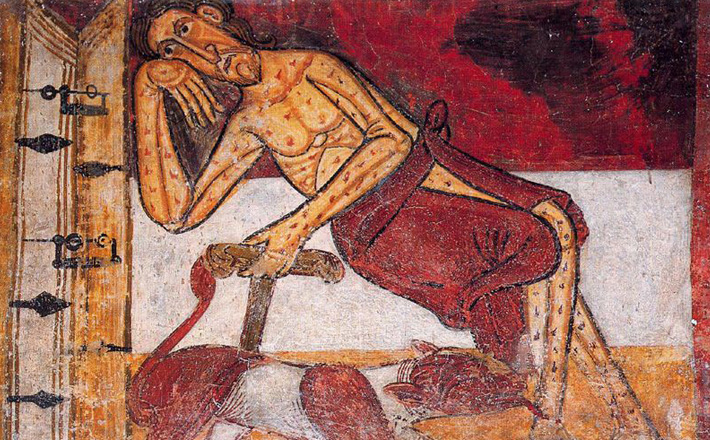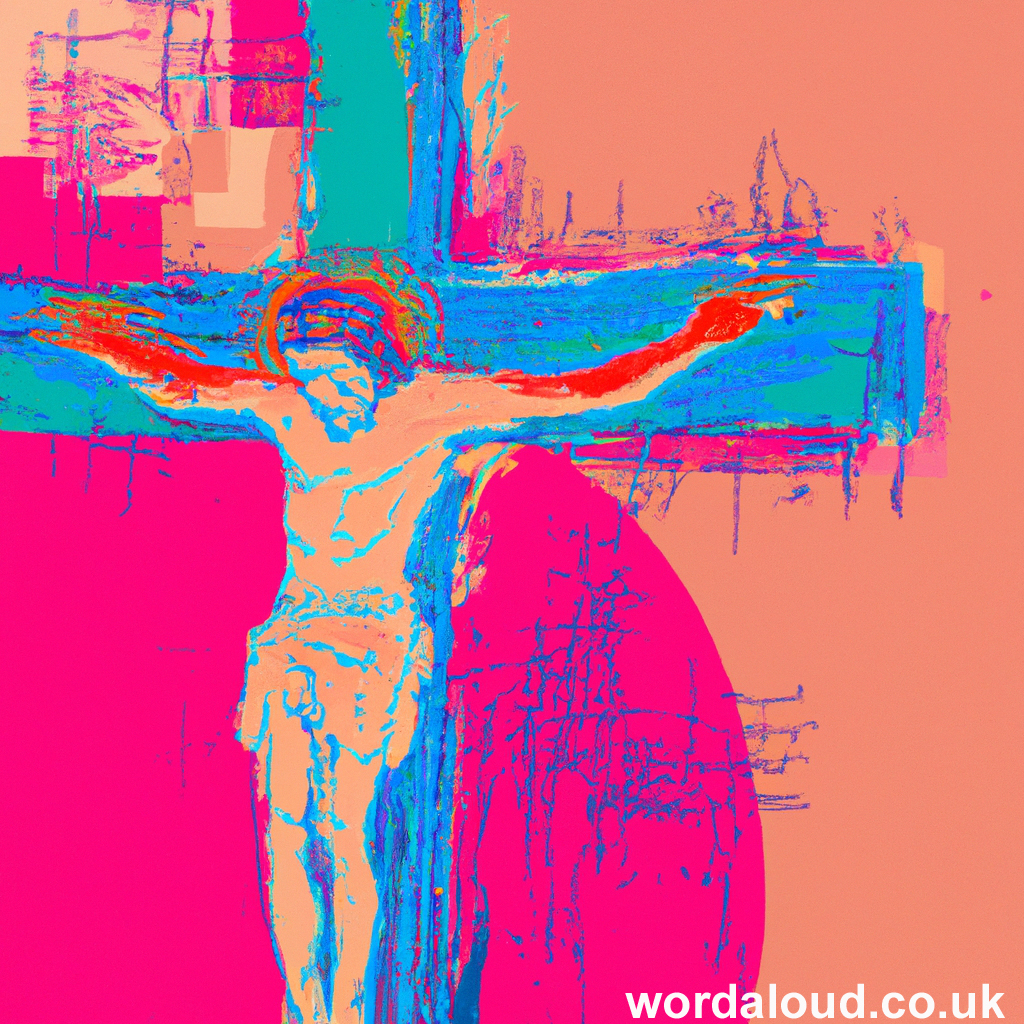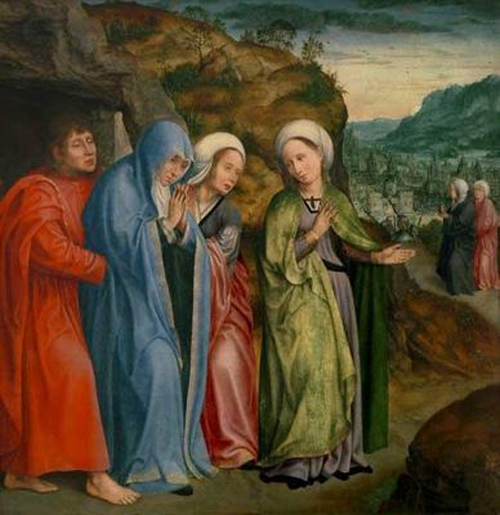Christian Art | George Herbert | Sepulchre | The Church | Content
George Herbert | The Temple | The Church | Content
Peace mutt’ring thoughts, and do not grudge to keep
Within the walls of your own breast:
Who cannot on his own bed sweetly sleep,
Can on anothers hardly rest.
Gad not abroad at ev’ry quest and call
Of an untrained hope or passion.
To court each place or fortune that doth fall,
Is wantonnesse in contemplation.
Mark how the fire in flints doth quiet lie,
Content and warm t’ it self alone:
But when it would appeare to others eye,
Without a knock it never shone.
Give me the pliant minde, whose gentle measure
Complies and suits with all estates;
Which can let loose to a crown, and yet with pleasure
Take up within a cloisters gates.
This soul doth span the world, and hang content
From either pole unto the centre:
Where in each room of the well-furnisht tent
He lies warm, and without adventure.
The brags of life are but a nine dayes wonder;
And after death the fumes that spring
From private bodies, make as big a thunder,
As those which rise from a huge King.
Onely thy Chronicle is lost; and yet
Better by worms be all once spent,
Then to have hellish moths still gnaw and fret
Thy name in books, which may not rent.
When all thy deeds, whose brunt thou feel’st alone,
Are chaw’d by others pens and tongue;
And as their wit is, their digestion,
Thy nourisht fame is weak or strong.
Then cease discoursing soul, till thine own ground,
Do not thy self or friends importune.
He that by seeking hath himself once found,
Hath euer found a happie fortune.

![]()
![]()
George Herbert | The Temple | The Church | Content
Herbert’s poem unfolds as meditation on inner peace and spiritual discipline, crafted through precise imagery and reflective admonition. Herbert begins with a command to restless thoughts, urging them to remain within confines of their own being. This invocation sets the tone for the poem as both a prayer and an internal dialogue, where the soul seeks to reconcile its innate restlessness with a divine imperative for order and calm. This act of addressing thoughts directly implies their unruliness, underscoring tension between human inclination toward distraction and spiritual call to stillness.
The poem’s exploration of restlessness expands into a critique of worldly desires. The metaphor of ‘gadding abroad’, connoting aimless wandering, portrays hope and passion as untrained forces, apt to pursue fleeting pleasures or ungrounded ambitions. This imagery suggests a spiritual wantonness, where contemplation becomes diluted by external pursuits rather than concentrated on divine truths. Herbert contrasts this with fire hidden within flint, content in its quiet potential until summoned. This fire represents a disciplined, self-contained soul, illuminating virtue of internalized strength and purpose over outward demonstration. Juxtaposition of restlessness and hidden fire reinforces the idea that true peace stems from alignment with divine calling, not from external validation.
Herbert draws from the natural world and human experience to articulate spiritual truths. The pliant mind, adaptable to both the opulence of a crown and the austerity of a cloister, embodies a balance of humility and resilience. This adaptability is not a sign of compromise but of spiritual maturity, wherein the soul can find contentment in any state because it rests ultimately in God. The image of the world as a well-furnished tent further emphasizes impermanence; the soul spans this temporary space without seeking adventure, signifying transcendence over worldly concerns. Herbert’s conception of contentment is not merely passive acceptance but an active alignment with divine providence, allowing the soul to rise above the temporal and the fleeting.
The poem also critiques vanity of human achievement and fame. The ‘brags of life’ are dismissed as ephemeral, their significance reduced to the ‘nine days’ wonder’ that fades into obscurity. Herbert juxtaposes the physical decay of the body with the intellectual decay of one’s deeds as they are consumed and reinterpreted by others. This critique extends to a chronicling of human accomplishments, which Herbert views as vulnerable to distortion and, ultimately, inconsequential in the divine scheme. By framing the body’s inevitable return to dust as preferable to the continual erosion of reputation by ‘hellish moths’, Herbert underscores futility of seeking immortality through human recognition.
The final stanzas of the poem return to the soul, urging it to cease its external distractions and focus inward. The conclusion—that self-discovery is the gateway to true fortune—distills Herbert’s central message: spiritual peace arises not from external achievement but from an inward alignment with God’s will. The soul that finds itself in God achieves a fortune not tied to temporal success but to eternal rest. This alignment reflects Herbert’s theological commitment to the idea that the human soul, though fraught with restlessness and vanity, finds ultimate purpose and fulfillment only in its Creator.
The poem’s structure mirrors its themes, with its disciplined quatrains reflecting the order and containment it advocates. The progression from addressing thoughts to critiquing worldly distractions and concluding with inward focus parallels the soul’s journey toward spiritual maturity. Herbert’s use of metaphor, rich in theological and philosophical resonance, elevates the poem beyond mere moral instruction. The fire, the pliant mind, the furnished tent, and the dust all serve as multifaceted symbols, offering layers of meaning that intertwine the temporal and the eternal.
Theologically, the poem aligns with Christian teachings on humility, contentment, and the fleeting nature of earthly life. Yet it also engages with broader philosophical traditions, echoing Stoic ideals of self-mastery and internal peace while reinterpreting them through a distinctly Christian lens. The pliant mind, for instance, recalls Stoic equanimity but is rooted in submission to divine will rather than self-sufficiency. Similarly, the critique of fame resonates with the Christian emphasis on spiritual rather than worldly legacy, where true worth is measured by one’s alignment with God rather than human acclaim.
Herbert’s meditation ultimately transcends its immediate context to address universal concerns: the tension between restlessness and peace, the allure of worldly achievements versus the call to spiritual humility, and the impermanence of life in contrast to the eternal. By presenting these themes through such vivid imagery and measured structure, Herbert invites the reader not only to reflect but to internalize the discipline and contentment he extols. The poem becomes both a prayer and a guide, offering a pathway to peace that rests in the unchanging foundation of divine providence.







